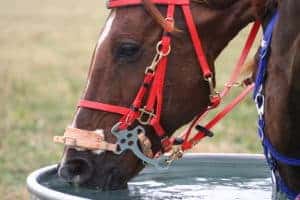Nutrition and Recovery for Eventing (and Other Hard-Working) Horses
- Posted by Clair Thunes, PhD

Q. I am an avid event rider and enjoyed watching the Land Rover Kentucky Three-Day Event. What kinds of nutritional support can you give horses competing in this level of competition to help them recover?
A. This is a great question. Any post-competition recovery effort starts with the base diet, which meet the horse’s daily requirements leading up to the competition. No long-term deficiency is going to get fixed in the short period during competition, so a balanced diet appropriate for the horse’s discipline and work level is crucial.
Part of that is ensuring the horse is getting the right kind of fuel to support the type of work that he’s asked to do. Event horses won’t only be utilizing stored carbohydrate on cross-country day but hopefully their reserves of fat stores, as well. Cross-country efforts will deplete glycogen stores (stored carbohydrates) in the horse’s muscles. The horse will need glycogen again for the show jumping phase, so restoring those stores is an important component of recovery.
Horses don’t restore muscle glycogen after heavy work particularly quickly, however—it can take up to 72 hours to fully replenish this important fuel source. The tactics human athletes use—such as “carb loading”—don’t work particularly well in horses. Not only has research found carb loading horses relatively ineffective at increasing muscle glycogen, loading with carbs such as starch could lead to colic.
Hydration
One thing that does help improve glycogen replenishment is making sure the horse is adequately hydrated. Muscle glycogen requires water for storage, so a dehydrated horse is less able to generate new muscle glycogen stores.

Hydration measures should begin well before cross-county day. Many horse travel long distances to events, and these long journeys cause surprisingly large amounts of sweat loss. Even when you can’t see the sweat, horses can lose very high levels of electrolytes during transportation. This puts them at a disadvantage before the competition even starts. Feeding salt every day and adding a well-formulated electrolyte while traveling will help horses remain hydrated. Consider arriving a day early if travel is particularly long, so your horse has time to fully rehydrate and recover from the journey before competition starts.
Horses that drink saline solution after exercise have been shown to consume more water in the subsequent hours than those that drink plain water. Consider acclimating your horse to drinking water after work with either salt or electrolytes so this is a normal practice at events.
Muscle Recovery
Hard-working horses might be muscle-sore after cross-country, and supporting recovering muscle might help your horse come out on Day Three with a little more spring in his step. Vitamin E is an extremely important antioxidant for muscle health. Oxidation of glycogen and fats to create energy for muscle contraction causes the formation of free radicals. These oxidizing compounds are unstable and damage cell walls if not removed. Vitamin E helps stabilize them by donating an electron so that a cascade of free radical damage is prevented.
Horses need to get adequate vitamin E every day and, because of individual variation, some horses—even when receiving enough vitamin E to meet the National Research Council guidelines—are vitamin E-deficient. The best way to know your horse is getting enough vitamin E is to ensure his base diet is meeting the stated requirement. Then have your veterinarian test his serum vitamin E levels. This will tell you whether you need to supplement additional vitamin E daily. Providing extra natural vitamin E after particularly heavy work such as cross-country day might aid in recovery.
During recovery from exercise, muscle protein synthesis increases in order to repair muscle tissue damaged during work. If adequate dietary amino acids are available in the 24 to 48 hours post work, a net protein gain might occur. The most important amino acid for this process is leucine, which is a branched chain amino acid (BCAA). For this reason, administering a supplement that provides BCAAs after especially heavy exercise might help shorten recovery.
Take-Home Message
In general, after strenuous exercise, ensure your horse has access to good-quality forage (this is a safe way to replenish carbohydrates and encourages water intake), increase electrolyte intake to replace losses and encourage water consumption, ensure adequate natural vitamin E, and provide BCAAs. Incorporating these into your program will help your horse be at his best for the third day as well as recover from the overall event as quickly as possible.

Written by:
Clair Thunes, PhD
Related Articles
Stay on top of the most recent Horse Health news with













One Response
Thank you for a great article, Can we give our horses BCAAs used for human consumption? Thanks.